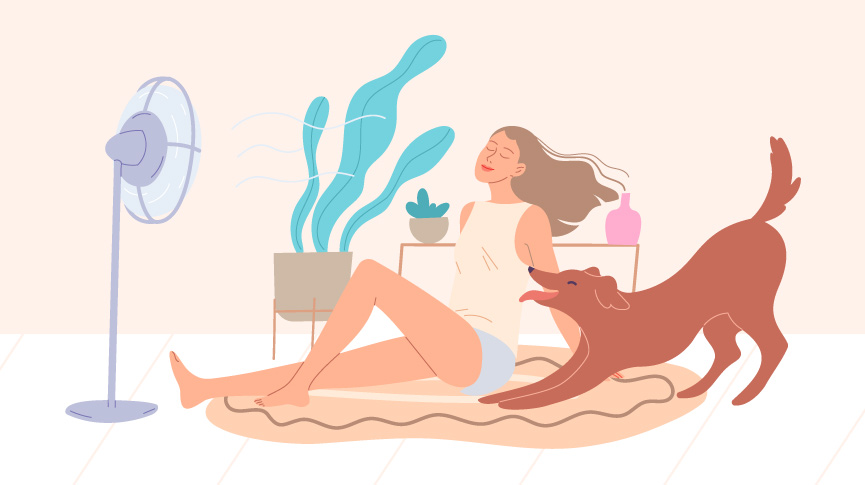Does hot weather make your period worse?

Summer brings sunshine, blue skies and vacation – but as the mercury rises it can also bring temperatures that are a little too hot to handle. If you struggle in the heat even when you’re not menstruating, you’ll know that having your period in hot weather can be pretty unpleasant.
But does the hot weather actually make your period worse? Strictly speaking, no, being in a hot climate doesn’t make your menstruation any worse. What it can do, however, is worsen the symptoms that you experience alongside your period.
To make sure you don’t melt during your menses, we’ve gathered a few of the most common period symptoms that can be exacerbated by a heatwave – along with a few tips on what you can do to make yourself feel more comfortable if you find yourself in this sticky situation.
Get a good night’s sleep
In the final week of your menstrual cycle before your period arrives, your hormones go on a bit of a rollercoaster ride. Your progesterone levels will climb and climb right up until your period begins, when they will suddenly drop sharply. This sudden swing causes disruption to many women’s sleeping patterns during the first week of their periods.
This hormonal jolt can cause a poor night’s sleep even when the weather’s mild, but if you’re in the middle of a heatwave, this can be worsened even further. Adding to that, longer daylight hours in summer will cause your body to produce less melatonin – the hormone that signals to your body that it’s time to go to sleep – making a good night’s sleep could be even trickier to find.
Your body uses extra energy while you’re menstruating, so you’re probably a little more tired than usual around your period anyway. While your body is expending extra energy on menstruation, it can leave you a little dehydrated, and you should drink more water than usual to maintain healthy fluid levels.
In hot weather, this goes double. You’ll most likely be a little dehydrated from the hot temperatures, as well from your period, so just make sure to maintain a steady intake of fluids during this time. A cold drink won’t just bring down your body temperature a bit, but it will also keep you well hydrated – and hopefully on the way to a restful night’s sleep.
Fight the bloat
Bloating is one of the most irritating period symptoms at the best of times – let alone when you’re also dealing with very warm weather. Hormone fluctuations during your menstruation can make your body retain more water and salt than usual, which leads to that horrible puffed out stomach feeling that we all know a little too well at this time of the month.
Similarly, when you become dehydrated in the heat, your body can try to hold on to more water than usual to fight this off, creating even more of a bloat.
Along with water retention bloating, you might also experience a bloated feeling from constipation, a common period side effect. Drinking water can also help fight the uncomfortable feeling of constipation, so definitely make sure to keep hydrated, and make sure to check out our top tips on fending off period-related congestion.
Head off headaches
Your estrogen levels climb steeply during the first two weeks of your period, right up until you ovulate. As your estrogen rises, so does another hormone, serotonin. Although this burst of serotonin can help improve your mood and help put paid to PMS, it also makes you more than twice as likely to develop a headache or migraine. Dehydration in hot temperatures can also lead to headaches – or makes existing ones even worse. This makes it more important than ever to keep up that all-important H2O intake when you have your period in hot weather.
If you can’t shift a bad headache, your pharmacist will be able to recommend some suitable over-the-counter painkillers. Alternatively, there are a whole host of homemade remedies you could try out, from using a cold compress on your forehead to massaging your forehead neck and temples.
Keep cleansed
You might start your period with very little testosterone in your system, but as soon as your menstruation begins, your testosterone starts to steadily rise, right up until ovulation. As well as ramping up your sex drive, testorone encourages your skin to create sebum. Progesterone is increasing at this time too, which causes your skin to swell and your pores to close. All of this works together to create the perfect environment for a nasty breakout.
When your skin is already breaking out because of your hormones, adding hot weather into the mix is, unsurprisingly, not going to help. As your skin sweats, the dried sweat, dirt, dead skin and sebum can lead to an outbreak of blemishes.
Always use sunscreen to protect yourself from harmful UV rays whenever you’re in the sunlight, but also make sure to cleanse your skin thoroughly too. Cleansing your skin will help remove excess sebum, sweat and dirt, and help to keep those pores fresh and clean. If, however, you’re losing the battle against hormonal-induced acne, speak to your doctor about treatment, or try a gentle anti-blemish skincare solution like niacinamide.
However you manage to ward off the unpleasant side effects of experiencing both your period and hot weather at the same time, just remember that (hopefully) neither of these things will last for too long.

A collective group of “lady experts” at Intimina who love sharing our personal experiences, even when they are a little too personal. We believe it’s time to start breaking down the taboos around menstruation, motherhood, and menopause, and start owning our female health.


